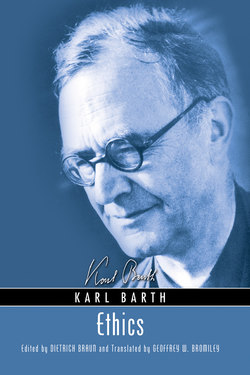Читать книгу Ethics - Karl Barth - Страница 5
На сайте Литреса книга снята с продажи.
ОглавлениеTranslator’s Preface
Karl Barth would never publish in his lifetime the lectures on ethics which the editors of the Swiss Gesamtausgabe have now presented in two volumes that are condensed into one in this translation. Nevertheless the lectures are of considerable interest for all who have a concern for theology in general and the theology of Barth in particular. There are three reasons why this is so.
First, they form an essential link in the development of Barth’s own thinking as an ethicist. When he delivered them, Barth was at a crucial point in the movement from earlier ethical concerns to the larger theological conception which underlies the ethical chapters in the Church Dogmatics. As he understood it, dogmatic theology included ethics within its compass. Hence the demand arose for a rethinking of ethical foundations. Yet Barth retained a highly practical ethical interest and with his special concern to avoid legalism and yet to maintain a structured divine command he saw himself committed to an exploration of the implications of his dogmatics for actual Christian conduct both personal and social.
Second, the lectures clearly came to serve as a first draft of the ethical section of the Church Dogmatics. Already the outline is clear: an introductory chapter (cf. Church Dogmatics II, 2), then successive chapters on the command of God the Creator (cf. III, 4), God the Reconciler (cf. IV, 4 Fragment and the unfinished and unrevised Christian Life), and God the Redeemer (cf. the chapter projected for V). When the lectures are compared in detail with the available material in Church Dogmatics, it will be seen that Barth also made considerable use of the contents of these earlier discussions. He was to revise, expand, rearrange, and alter, and especially to drop the concept of the orders of creation, but the positive relation should not be minimized on account of the changes.
Third, the lectures have interest in their own right. Even Barth’s attempt to work with a doctrine of the orders calls for attention. The comparatively stronger influence of his Social Democratic leanings, e.g., in the criticism of competitiveness, is also significant. The emphasis on collective pressures, e.g., that of developing technology, answers in advance a later criticism of Jacques Ellul in his Ethics of Freedom. Many of his themes, problems, and conclusions are astonishingly relevant today even though the lectures were given fifty years ago and the topical allusions and illustrations have obviously dated. Above all, his general rooting of ethics in dogmatics still calls for one consideration in antithesis to the inveterate tendency either to base it on law and tradition on the one side or on pragmatic concerns and changing mores and circumstances on the other.
It should perhaps be pointed out to readers that the notes and textual markings in this translation have been taken over from the original Swiss edition. For an explanation of the critical apparatus readers should consult the Editor’s Preface which follows.
GEOFFREY W. BROMILEY
